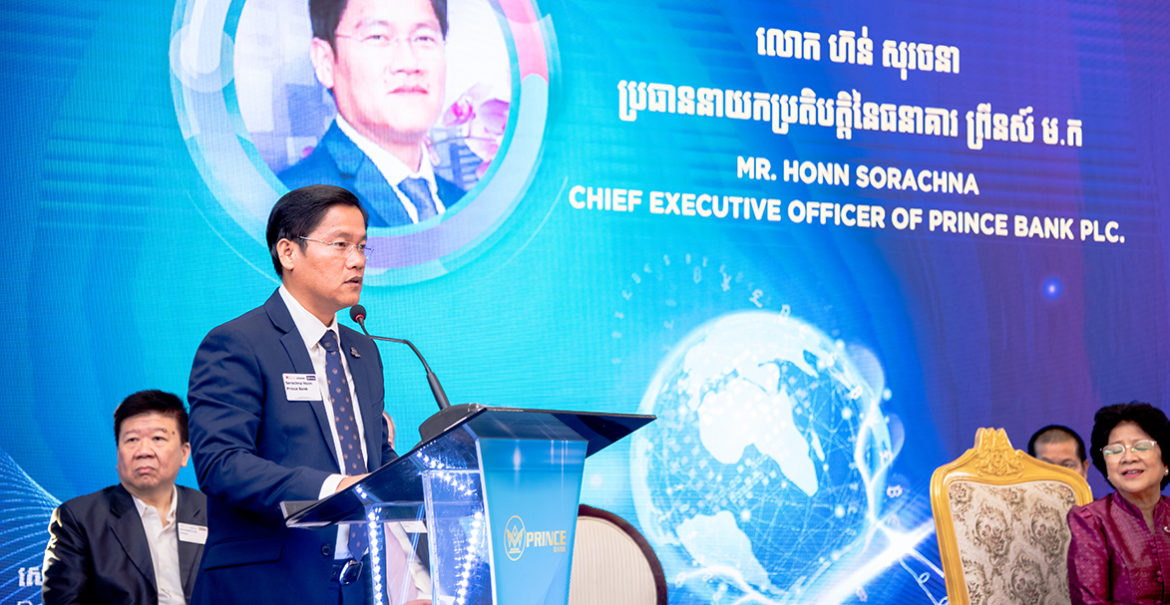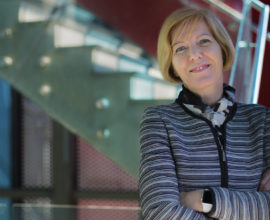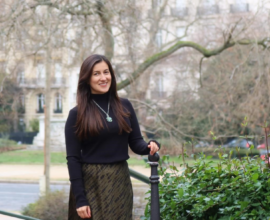Sorachna Honn
Banker and Buddhist
![]() Reading Time: 10 minutes
Reading Time: 10 minutes
CEO & MD AT PRINCE BANK
Like all Cambodian boys, Sorachna Honn has been raised to respect his elders and his teachers, to work hard and with integrity, to provide for his family and to remain humble and compassionate. At the age of 40, he still embodies the traditional Cambodian values which are steeped in age-old Buddhist traditions. What sets Sorachna apart and explains his success in setting up one of the best-performing banks in South-East Asia, is an additional set of qualities. Endowed with maturity and good observation skills, over the years he has developed a sense of curiosity for human behaviour and for the world, that has encouraged him to look beyond his own backyard.
In 2015, Sorachna set up a microfinance institution from scratch. Just three years later, it was awarded a commercial banking licence. It isn’t just the sheer speed of development that is impressive. The accumulation of international accolades is a testament to Sorachna’s belief in corporate citizenship. These include “Asia’s Top 100 Best Employer Brands for 2019” by the Employer Branding Institute, “Cambodia’s Best Employer Brand for 2020” by World HRD Congress, and “Cambodia’s Best Commercial Bank 2020”, from International Banker. And for Sorachna, “there’s no stopping here”. His ambition is very much to play in the big league, with his sights set on the world stage.
In this interview, Sorachna recalls his journey and especially his fond memories of his time at Audencia. He explains how joining the IMM programme was pivotal in shaping his career...and in creating a lifelong aversion to sausages!
Were you brought up in accordance with traditional Cambodian values?
Very much so. My family is of Chinese descent and settled in Phnom Penh a few generations ago. That’s where I grew up. I am the eldest of three sons. My parents were not particularly wealthy and had to work long hours, so my grandma looked after me a lot. I was raised to be a respectful and obedient boy at home, and my family and neighbours often praised me for being kind and helpful.
I was born shortly after the end of the Pol Pot regime and its barbaric mission to decimate the country’s intellectuals. Despite the intimidation campaigns, my mother retained a deep admiration for the teaching profession throughout those traumatic years. She instilled in me this sense of respect, and for many years, I dreamt of becoming a teacher myself. My mother had high expectations when it came to my homework, and she was constantly encouraging me to pick up new skills. I have fond memories of those years though, as I loved school and studying. I suppose my education would be considered strict by today’s western standards, but I only feel gratitude towards my relatives and teachers for the way they nurtured me.
So, you were not the type of child who would lark around in the playground just to become popular?
Well, you had more chance of finding me on the sidelines, watching my friends play, rather than at the heart of the action… especially if I sensed that their games were going to get them into trouble! From a young age, I have been a keen observer of the people around me. That was my way of learning, and to this day, I have retained this interest in human behaviour.
I wasn’t a coward though. In fact, I have always been curious and independent, and I was happy to go to school on my own from the age of five. I was regarded as the most mature child in the group and I was elected as the school leader. So, I guess I must have been popular, …in my own way that is!
Why did you decide to go abroad to study for your master’s degree?
Whilst I was studying my bachelor’s in engineering in Phnom Penh, I started working as an English instructor. When I finished Uni in 2003, I worked for an insurance company, and then for an institution run by American experts providing financial technical skills. This is when I realised how strong the banking industry was getting in Cambodia, so I joined Canadia Bank, the largest local bank, as a loan officer. The turning point for me was when I realised that the work experience that I had accumulated was never going to allow me to progress far enough in the banking sector. Therefore, I decided to upgrade my financial and management knowledge, and enrolled at the Royal University of Law & Economics, which I knew had a partnership with Audencia. Once there, I studied really hard and I managed to fulfil my dream of joining the double degree programme to study in Nantes.
Tell us about your experience of adapting to the French way of life….
It was my first time in Europe and I had never been so excited. Luckily, there was a tight-knit Cambodian community in Nantes. One friend in particular took me under her wing and helped me find accommodation. For the first three months I stayed in a mobile home on a campsite near the school, and I loved it! I had mentally prepared myself for a culture shock, so I adapted quite well. I was determined to make the most of my stay and to open myself up to discovering as much as possible. I had already decided to try absolutely every new food that came my way. The most interesting culinary discoveries I made were couscous and kebabs. However, there is one French speciality where I had to draw the line… sausages! The mere recollection of tasting a sausage horrifies me!
What is your best memory of being a student on the IMM programme?
I was impressed at how the staff at Audencia made international students feel so welcome and helped us to integrate. The curriculum and resources were of a very high standard. I even brought back some HR and project management case studies in my suitcase: I still have them in my home office!
My class was a real melting pot with students from France, China, India, Vietnam, Canada and Morocco. There was a fantastic atmosphere in the group and we often went downtown for some drinks… even though I don’t drink much, so I went along mostly for the company. It is hard to single out my best memory but our international workshop in Poland was probably the highlight. I had my first snowball fight there, at 27 years old. In fact, it was the first time I had ever seen snow. This memory will stay with me forever.
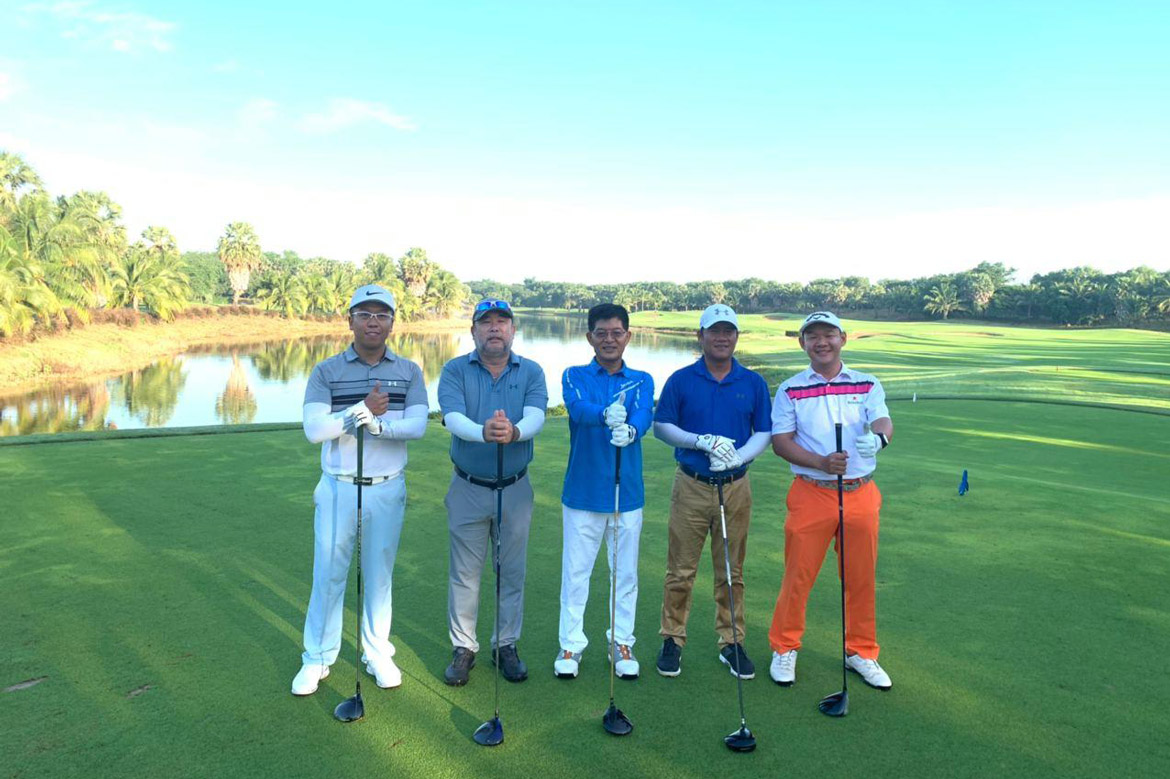
What is the biggest impact this experience has had on you?
Prior to leaving, I regarded myself as a local Cambodian guy. During my time at Audencia, I spent a lot of time observing my fellow students, the teachers, and my Cambodian expat friends. I analysed their way of learning, working and socialising. In less than a year, my eyes opened wider, and I had some sort of awakening. I realised how big the world was – much bigger than I originally thought – and that being “just” Cambodian would not be enough. I promised myself that I would keep on challenging myself to always remain curious about what lies beyond my comfort zone. I often reflect on this time of my life, and I remind myself how lucky I was to have been on this journey.
Why did you decide to go back to Cambodia?
Whilst in Nantes, I have formed some strong bonds with lots of Cambodian friends and relatives who had emigrated there. I even got involved in a friend’s grocery business. Many grew fond of me and asked me to stay in France. They were trying to convince me that my future would be much brighter there than in my home country. They suggested possible ways to keep me from leaving, which I took as a compliment. But it had always been clear in my mind that I would eventually go back to Cambodia.
I was well known to senior managers at Canadia Bank, where I had been working previously, and I had kept in close contact with one manager in particular who promised me that upon my return, I would be able to find a suitable role within the company. Canadia was an established and reputable bank with a wide network across the country. As I sensed a shift in the global economy towards the East, I knew that going back to Canadia would be a strategic career move for me.
How did you come up the idea of setting up your own financial institution?
Upon my return from Nantes in 2008 and right up to 2013, I was assigned to be in charge of several Canadia branches, first in Phnom Penh, and later in more rural areas. That experience proved invaluable in giving me a first-hand view of the challenges faced by business owners, especially small and medium enterprises (SMEs). I became acutely aware of how the difficulty of accessing financial services was keeping so many SME owners in poverty. I was tempted by the idea of setting up an institution to tackle this issue. The person who is now my boss gave me a hint that he had the ambition to own a bank in the coming years, and that he wanted me to run it. It took me a while though, to gain the confidence that I was qualified enough to take on this responsibility. Being repeatedly recognised by my senior managers for my hard work, results and sense of integrity finally encouraged me to take the plunge, and in 2015 I set up Prince Finance Plc.
This is a very admirable and ambitious project! What was the biggest challenge you had to overcome?
Recruiting the right talent has always been my main priority. I have a vivid recollection of a particular day, right after I had made up my mind about launching my own venture. I was sitting alone in a coffee shop by my mum’s house, in Phnom Penh. I was scratching my head wondering how on earth I would manage to convince anyone to embark on this project with me. I got introduced to someone who was experienced in microfinance, and who believed in my vision. We struggled to get our first hires because many professionals with high qualifications in banking were wary of joining an organisation that was starting from scratch, and they thought that microfinance was too niche. So, we went for a broad and open recruitment strategy. For me, people’s technical ability mattered less than their attitude and commitment. I made it clear that the journey ahead would be hard, stressful and outside of everyone’s comfort zone, including mine. At the end of the first year, several senior position employees of the first batch had quit but we grew to become a team of 150. We reached 200 in the second year, and in 2018, we obtained a commercial licence for what became Prince Bank. Running a commercial bank requires specific knowledge and skills that I was aware I didn’t have. But my strength was that I could tap into my network and recruit highly qualified bankers.
Prince Bank differentiates itself through its commitment to social development. What form does it take and why is it important to you?
Small and Medium Enterprises are the main pillar of the Cambodian economy. To me, they are the key to raising the living standards of the whole nation. Our country has millions of people who are full of ambition and desperate to start their own business. So, we provide special loans, with low interest rates and a long-loan term, and we aim to support them on their journey with a spirit of “winning together”.
I place corporate social responsibility at the core of the company. Our company’s success goes hand in hand with our society’s welfare, so it is imperative that we give back to the communities in which we operate. Many of our CSR projects are linked to improving education in Cambodia because I believe that development starts from the ground up, with well-educated citizens.
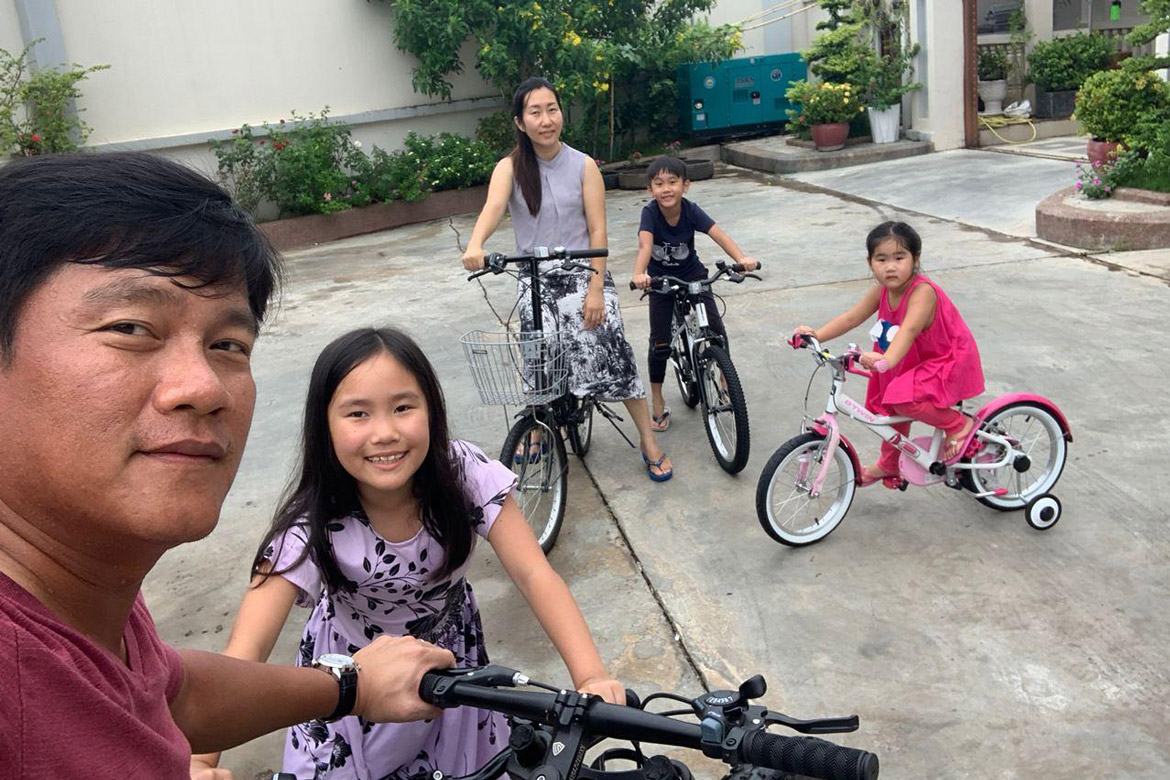
Microfinance is an increasingly popular sector. What would be your advice to Audencia’s students who are thinking of working in this field?
Microfinance is a way of lifting individuals out of poverty by giving them access to microcredits for their own business. This strategy has been an integral part of Cambodia’s economic growth, and one of the biggest successes for financial inclusion worldwide. Some international financial organizations have recognised Cambodia as a role model for other developing countries, such as southeast Asia or South Africa. It is a fascinating discipline that evolves rapidly, so I would advise anyone interested to gain a great deal of expertise, much more specific than the expertise I acquired myself 5 or 6 years ago.
What is it that brings purpose and meaning to your everyday life?
I don’t own Prince Bank but I feel as committed to it as if it were mine. I consider that my mission is to fulfil the owners’ vision for the company. I just want “my” Prince Bank to be the leader in Cambodia and possibly in a few years’ time to expand beyond our borders. Hopefully, the world can one day benefit from my bank’s services. What drives me is to continuously empower my colleagues – at all positions, through high-quality training, so they can develop and do their job to the best of their abilities.
How do you cope with such a high-pressure job?
I am not going to lie; my journey hasn’t always been a walk in the park and I have endured many nights on very little sleep. What keeps me sane, is the reassurance that I have recruited talented individuals whom I can totally trust. But I fully accept that stress comes with my job, and I manage this by working out. Lately, I’ve picked up golf; undeniably a convenient way of combining exercise with networking.
Spending time with my children, who are 3,6, and 9, is also essential. I leave the house early and get home late, so I kiss them goodnight when they are already asleep, I often have work functions during the weekend, and I am reachable for work 24/7… So, time with them is definitely more about quality than quantity! They complain that they don’t see me enough; so, when I am with them, I try to be fully present. To make it up to them, I let them pick the games we play. I am fortunate to be married to a wonderful woman who endures most of the stress of our everyday family life!
What do you wish for your children’s future?
I just wish they are wise and smart enough to pick something for themselves. I hope they will find their own path the same way that I have found mine. I will certainly encourage them to try.
What are your plans for the weekend?
I am taking my family on a 3-day trip to Kampot, a coastal town in the Southwest of Cambodia. We will spend some relaxing time in nature, with my boss and his family. Even if it’s only for three days, I look forward to the kids giving me a break and not complaining that I work too much!
